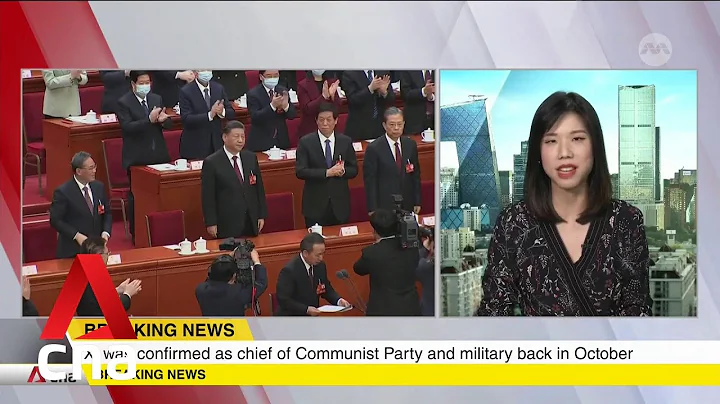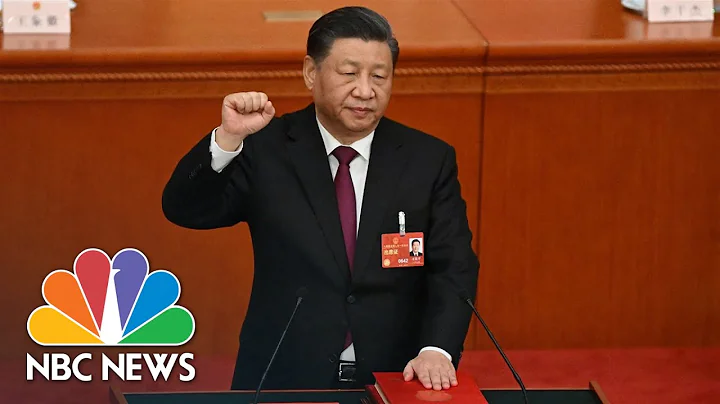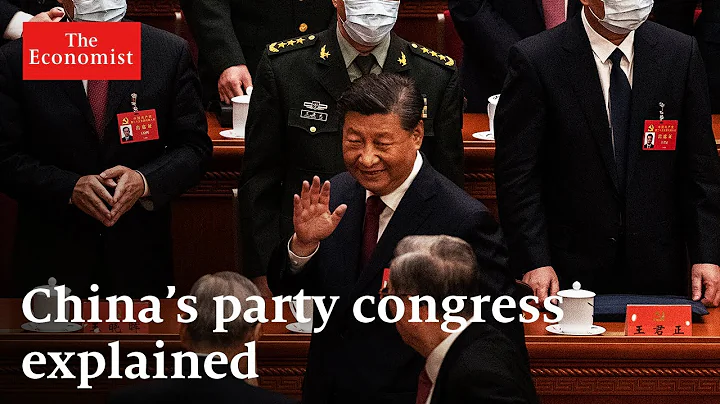One day in 1954, a Taiwanese newspaper, under the instruction of Chiang Ching-kuo, published a highly offensive article, attributing the failure of the Kuomintang in the mainland to the so-called wealthy families. When Chiang Kai-shek and his son were defeated and fled to Taiwan, they had already severely criticized three of the four major families except the Chiang family. However, Chiang Ching-kuo's article single-handedly targeted Kong Xiangxi .
Kong Xiangxi was still in the United States at that time, why did Chiang Ching-kuo suddenly attack him? In 1948, Chiang Ching-kuo "hunted tigers" in Shanghai in an attempt to save the Kuomintang government's economic collapse, but in the end the attack hit the Kong family's son, and encountered obstacles and could no longer proceed. But after so many years, Chiang Ching-kuo once again attacked Kong Xiangxi, of course it would not be because of this past incident. To be fair, Kong Xiangxi made countless fortunes and was a sinner to the Chinese people, but to the Chiang Dynasty, he could be regarded as an out-and-out "hero".

Kong Xiangxi is known as "Haha Kong". He himself has repeatedly claimed that he believes in moderation, is tolerant, and never does anything that makes things difficult for others. In fact, Kong Xiangxi had his own set of rules for dealing with people, which was to obey Chiang Kai-shek's orders. In addition, he judged that there was no right or wrong in things. As long as it did not harm the fundamental interests of Chiang Kai-shek and himself, he would praise what should be praised and treat what should be treated without mercy. What Kong Xiangxi is most passionate about is amassing money, amassing money without restraint.
In November 1933, Kong Xiangxi replaced Song Ziwen, who was not respectful to Chiang Kai-shek, as the Minister of Political Participation. His first "official duty" after taking office was to call on the country to "generously donate" to fund the war to "suppress communism". The issuance of public bonds was one of the important means by which Kong Xiangxi raised funds and amassed wealth for the Chiang Dynasty. He tied financial capital to the Nanjing government with huge public debt.
Under the temptation of high interest rates and political pressure, most of the public bonds were subscribed by major banks. If they did not want their huge debts to be turned into waste paper due to the change of regime, they had to support the existence of Chiang Kai-shek's regime. Moreover, a large amount of public bonds were treated as official shares and added to Bank of China , Bank of Communications and Commerce, Siming, Guohuo, China Industrial and other banks, making these banks gradually controlled by the National Government and became vassals of the four major families bureaucratic capital . The four major families of Jiang, Song, Kong and Chen relied on their political privileges to make a fortune by issuing public bonds and engaging in debt speculation. Kong Xiangxi's "public debt policy" can really be described as "killing three birds with one stone." However, the issuance of large amounts of public debt has brought disastrous consequences to China's industrial, commercial and rural economy.
Kong Xiangxi’s efforts in making money for his family are even more unpredictable. When he and Soong Ailing got married, they bought a house for 15,000 yuan. Song was dissatisfied with the house and often complained. Kong Xiangxi didn't say anything. Within a year, he sold it for more than 30,000 yuan, more than doubling the profit. Kong Xiangxi then said to his wife: "Excuse me, is there any legitimate business in the world that can earn more than 100% profit?"
Then, he used the 30,000 yuan to buy a house on Fukaisen Road in Shanghai. The next time, Song Ailing thought that the old owner of the house was the revolutionary Huang Xing. His name was too famous and he would "suppress" him, but he was not satisfied. Kong Xiangxi said: "Don't be busy." However, within a few months, the current situation changed and the price of the house continued to rise. It was sold for a "beautiful price" of 60,000 yuan. Kong used the money to buy another one on West Aixian Road. In a few years, the original price of a house of 60,000 yuan has soared to 600,000 yuan. This kind of speculation is beyond the reach of even professional real estate developers today. At this point, Song Ailing was completely convinced of her husband's ability to make money.

Making money by speculating in houses relies on extraordinary acumen and judgment, which is understandable. Kong Xiangxi's real fortune came when he became the Vice President of the Executive Yuan and the Minister of Finance. He relied on his power to make huge changes in the financial field and made huge profits.What needs to be explained is that Mrs. Kong Song Ailing has a straightforward personality and is good at making decisions. However, she is even more greedy and greedy than her husband. She has great ambitions to pile up money to become Mount Everest and regards China's finance as her own purchase. The small account of the dishes.
Kong Xiangxi has a timid and soft side in his character, and his wife's decisiveness has pushed his "specialty" of fraud for personal gain to a higher level. For example, Song encouraged Kong Zongquan to manipulate the stock market, and he and the deputy minister Xu Kan, who was also notorious, made a concerted effort to spread false news, triggering the "second and third pass" treasury bonds trend. Later, insiders recalled that they could earn at least 25 million in price differences. .
The Pacific War broke out, and the U.S. government sold US$100 million in public bonds to China. At that time, the listed exchange rate between US dollars and legal tender was 1:20, but the black market price was that 1 US dollar could be exchanged for 100 legal tenders. Song Ailing saw the clues, her eyes almost turned golden, and she instigated her husband to do the trick. After half of the sale was announced to the public, it was announced that it was sold out. In addition to dividing the spoils and gagging some handling officials, about 40 million US dollars of public debt was "big belly can't tolerate it." Kong Xiangxi returned home and made trouble in the black market. Calculated based on the price difference of earning 80 French currency for 1 U.S. dollar, 40 million 80 is a huge and terrifying amount of money - about 3 billion French currency.
In 1942, when Kong Xiangxi was the Minister of Finance, he used 200 million U.S. dollars in U.S. loans to purchase supplies for the National Government. He asked Soong Ailing to stockpile a huge amount of goods in advance. The couple "cooperated sincerely" and received cash in exchange for the goods. This matter was later investigated by the US Intelligence Agency, and a document was released. Although there is no conclusive data on how much huge profits were obtained, the document speculated that it would not be too far apart if it was not US$100 million.
At that time, the country was in the midst of a difficult War of Resistance Against Japan. Frontline officers and soldiers relied on crude weapons and patriotic enthusiasm to defend the country from aggression. Due to insufficient military spending, many troops were fighting hungry and lacking ammunition. The wounded soldiers were left in pain and waiting to die because there was not enough medicine. Tens of thousands of refugees in the war starved to death on the way out every day because they lacked a bite of porridge to eat.
In addition to credit fraud and foreign exchange manipulation, Kong Xiangxi's methods of amassing wealth also include increasing taxes, arms trade, gold speculation, smuggling, etc. There are many ways. But what he admires most is the indiscriminate issuance of banknotes.
Kong Xiangxi once said to people: "Issuing public bonds is really troublesome. You have to pay interest, draw lots to repay the principal, and you can't get much money. It is much simpler than printing banknotes." The impact of the indiscriminate issuance of banknotes is that the currency value is miserable. Falling prices and hyperinflation. In 1937, 100 yuan of legal currency could buy two cows. In 1943, it could buy one chicken. By 1947, it could only buy one-third of a box of matches.
According to the "A Brief Life of Mr. Kong Yongzhi" written by Chiang Kai-shek: When Kong Xiangxi resigned and stepped down in 1944, the Kuomintang government's treasury contained only two items, including foreign exchange and gold and silver coins, worth more than 1 billion US dollars. Kong Xiangxi's daughter Kong Lingjun once said: " After eight years of fighting, my father saved more than one billion US dollars for him (Chiang Kai-shek). It cannot be said that he has no credit. " From this aspect, Kong Xiangxi can be called the Chiang Kai-shek dynasty The "minister of gathering".

In the late period of the Anti-Japanese War, Kong Xiangxi was brought to the National Political Suffrage Council due to the scandal of swallowing huge amounts of US dollar public debt. He couldn't survive anymore. In May 1945, he had to "resign" from the position of Vice President of the Executive Yuan, and in July he resigned from the position of President of the Central Bank of China.
In 1946, Kong Xiangxi carefully cleaned up his property in Shanghai and moved what he could take away to Hong Kong and abroad as much as possible. In the summer of 1947, Kong Xiangxi returned to his hometown of Taigu, Shanxi.
In Taigu, Kong Xiangxi hosted a grand banquet for all his relatives and then said goodbye to them. After everything was fully prepared, he first asked his wife Song Ailing to go to the United States, and he came to Shanghai in the autumn of this year. A few days later, Kong Xiangxi sent a telegram to Chiang Kai-shek and the Central Committee of the Kuomintang. On the grounds that he "suddenly received a call from his family from the United States, saying that his wife was suffering from a malignant disease and was in a serious condition." Without waiting for Chiang Kai-shek's approval, he hurriedly bought a plane ticket and flew there. To the United States.After
went to the United States, Kong Xiangxi and Song Ailing moved into a luxurious villa in Riverdale, not far from New York. Kong Xiangxi drives to Wall Street two or three days a week to take care of his Bank of China New York branch, and works at home the rest of the time. Columnist Drew Pearson believes that the Bank of China is actually the "nerve center of the Yuan Foreign Aid China Group". He reminds his readers that through the various offices of the "Yuan Foreign Aid China Group", the Nanjing National Government will transfer tens of millions of USD transfers to pay for blitz style promotion costs.
Pearson specifically mentioned that Kong Xiangxi had earlier chosen Johnson as his personal lawyer. Later, Johnson became the Secretary of Defense in the Truman Cabinet and became one of the strongest advocates for the United States to support Taiwan. Kong Xiangxi also visited New Hampshire Senator Bridges several times, and the senator had been urging aid to Taiwan and Chiang Kai-shek's exiles. Seagrave mentioned in "Song Dynasty" that during Nixon's campaign for the Senate, Kong Xiangxi sent his son Kong Lingjie to make a special trip to Los Angeles to send donations and encouragement, and also persuaded California many Chinese voters to help elect Nixon.
In 1948, the Kuomintang failed repeatedly in attacking the liberated areas. Chiang Kai-shek had to ask his wife again to go to the United States for help. But this time, they hit a wall. Truman was cold and hard towards this "Mrs. President Chiang Kai-shek". Soong Meiling had to temporarily stay at Soong Ailing's home to pursue plans. Although Kong Xiangxi was resentful of Chiang Kai-shek, he still obliged to help lobby the US government. Bridges happened to be the chairman of the Senate Appropriations Committee at the time.

Kong Xiangxi’s life in the United States is very luxurious. In addition to the luxurious villa in Riverdale, they also spent more than 1.6 million US dollars to buy a high-end residence in the suburbs of New York. At the same time, Kong Xiangxi also lived in a family on Broadway Street in New York’s most prosperous downtown. Star hotel, long-term rental of a room, rent for 150 US dollars per day. Such high consumption makes even the richest Americans feel inferior.
However, the United States is not the stable "oasis" that Kong Xiangxi imagined. In 1951, the U.S. Congress called Wedemeyer to testify in order to investigate the MacArthur incident. At that time, Wedemeyer said that when the war between the Kuomintang and the Communist Party reached its climax and the Nationalist Government in Nanjing was on the verge of economic collapse, he gave Chiang Kai-shek a list and advocated ordering the powerful officials of the day to donate assets to supplement military expenditures. But when Chiang Kai-shek saw that Kong Xiangxi was at the top, he became furious and said that those listed on the list were all his loyal cadres for many years and were not as rich as outsiders said. The next day, American newspapers published Wedemeyer's speech as headline news, causing public outcry.
U.S. President Truman has always been indignant at the corrupt officials of the Kuomintang for lining their own pockets with their huge U.S. aid. Under Truman's direct order, the FBI began to investigate the properties of the Kong family and Song family in the United States, and implemented secret surveillance on Kong Xiangxi. Regarding this, Kong Xiangxi was in panic all day long.
Later, Kong Xiangxi found an American friend who gave him an idea.
First of all, Kong Xiangxi and this friend conducted various behind-the-scenes activities, and finally got through the joint. The U.S. Senate Foreign Affairs Committee and the U.S. Department of the Treasury released a similar "proof" material, saying that all overseas Chinese in the United States together with the Bank of China Including, all deposits do not exceed 50 million US dollars, which refutes Truman’s speculation about 1 billion US dollars.
Then, Kong Xiangxi made an exception to meet reporters and made up some lies. He said: "My ancestors have always been running ticket companies and businesses, and the family property is finally rich. However, in the past few decades, due to inflation and frequent wars, most of the ancestral property has been lost. I invested in domestic The capital of various industrial and commercial enterprises was completely wiped out by the fall of the mainland. The civil war since the Republic of China and the fall of the mainland have caused the Kong family to suffer heavy losses. The current daily necessities are only the little savings left."After saying this, he looked sad, as if he really had nothing.
This trick really worked. The FBI's surveillance and investigation could not be brought to an end, and Kong Xiangxi's crisis was also resolved.

In 1954, Chiang Kai-shek held a meeting in Taiwan The second so-called "National Congress". Kong Xiangxi believed that the time had come to revisit his old dream, so he suddenly had the idea to return to Taiwan to run for the so-called "Vice President". To be cautious, he sent Wei Daoming, who had served as Chairman of Taiwan Province, to arrive first Taipei went to explore the market.
At this time, Chiang Kai-shek was no longer interested in Kong Xiangxi. He had long forgotten his brother-in-law who fled to the United States. In order to rebuild the Chiang family dynasty in Taiwan, Chiang Kai-shek placed his hope on the prince, Chiang Ching-kuo. A series of measures were taken to reform the Kuomintang, re-arrange personnel, reuse , Chen Cheng and others, and let them assist the prince. This pattern gradually formed, and it was impossible for Kong Xiangxi to get involved. As for the position of deputy, Chiang Kai-shek had already arranged it Leave it to Chen Cheng.
As soon as Wei Daoming arrived in Taiwan, Chiang Kai-shek knew what he meant and quickly instructed Chen Cheng and Chiang Ching-kuo to block Kong Xiangxi’s representatives. Only then did Chiang Ching-kuo instruct the newspapers to criticize the wealthy family and pointed the finger at Kong Xiangxi. Even Wei Daoming He was also scolded as a lackey of a wealthy family , and returned to the United States in despair to return to Kong Xiangxi.
Kong Xiangxi's hope of comeback was completely shattered, which was a big blow to him. After that, Kong Xiangxi no longer interacted with politics, and the political desire in his heart was as dead as ashes. Normally, he will not relapse. Usually, he only participates in some charity activities, such as donating money to charities, setting up scholarships at universities, etc. He seems to have changed. He gives the impression of an old-fashioned appearance and a helpless look. .
But as he grew older, Kong Xiangxi’s nostalgia for the past and his hometown became more and more intense. Whenever he calmed down alone, his thoughts returned to his Shanxi. But now it is the world of the Communist Party, and he There was no way he could go back. After thinking for a long time, he decided to return to Taiwan. As for whether Chiang Kai-shek would welcome him back, he thought it would not be a problem to return to Taiwan and become an ordinary civilian.
In 1962, Kong Xiangxi was already 80 years old, and Chiang Ching-kuo His successor status was basically determined, and he was finally able to return to the country. On October 23 of this year, Taipei Songshan Airport senior officials gathered. Chiang Kai-shek and his wife, Chen Cheng and his wife, Zhang Qun, Yu Youren, Xie Guansheng, Gu Zhenggang and others went to the airport to greet him. Chiang Ching-kuo got on the plane and helped 83-year-old Kong Xiangxi and 74-year-old Song Ailing down.
But since then, Chiang Kai-shek has been lukewarm to Kong Xiangxi's arrival, and only gave Kong Xiangxi a courtesy greeting. After visiting and talking to him, he was given a false position as a "evaluator of the Central Evaluation Committee of the Kuomintang" and ignored him.

Chiang Kai-shek's attitude greatly disappointed Kong Xiangxi, so he had to swallow his anger and stay for the time being. He feels that the living environment in Taiwan is very friendly, but living there does not feel as free and comfortable as in the United States. Therefore, after Kong Xiangxi barely spent three years and four months in Taiwan, he left Taiwan again on February 28, 1966, under the pretext of going to the United States for medical treatment, and was determined not to come back.
On July 22, 1967, Kong Xiangxi got up, lay on a soft back chair, and read the newspaper casually. Suddenly, he felt extremely uncomfortable, and his family rushed him to a hospital in New York for treatment. Doctors stabilized the condition for a time. But his condition began to deteriorate again on August 10, and he died in New York Hospital on August 16 at the age of 87.
" The New York Times " made this comment on Kong Xiangxi's life: Mr. Kong is a controversial figure.
To the Chinese people, Kong Xiangxi is an out-and-out sinner. At the end of 1948, he was ranked ninth in the list of Kuomintang war criminals published by Xinhua News Agency .
References
"The Final Ending of the Forty-Three War Criminals of the Kuomintang", He Ming, Chinese Communist Party History Press
"The Last Years of Kong Xiangxi", Fan Xiaofang, Li Yongming, Literature and History Expo
"The "Money-Making Official" Kong Xiangxi", Zhao Yang, literature, history, spring and autumn




















